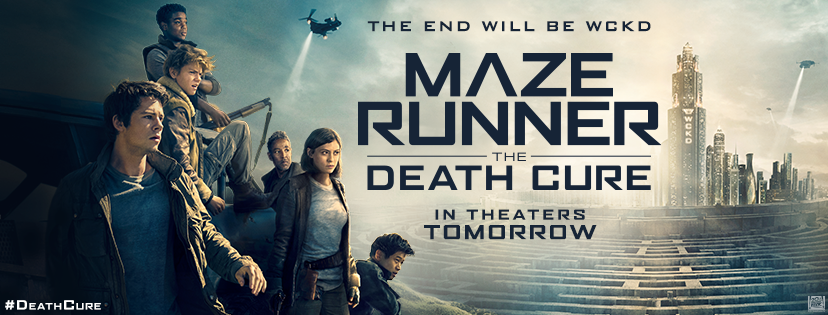
NEW YORK— Moviegoers who come late to the “Maze Runner” franchise, which now numbers three, will doubtless have one very reasonable question: Where, pray tell, are all the mazes I was promised?
Alas, the maze of “Maze Runner” referred to as “the Glade” by the few dozen teenagers who were mysteriously dropped into it has been in the rearview since the first 2014 installment, a modestly budgeted YA adaption and a bit of a “Hunger Games” knockoff. But what the two sequels, first “Maze Runner: Scorch Trials” and now “Maze Runner: The Death Cure,” have lacked in labyrinths, they have made up for in running.
Literal running but also a genuinely kinetic forward movement. The “Maze Runner” films, which have all been directed by former visual effects supervisor Wes Ball, move better than the average dystopia. So many fantasies bog themselves down with backstory and world-explaining, but the chief pleasure of the “Maze Runner” films is that the characters are perpetually grasping their predicament right along with the audience.
And like the previous chapters, “Maze Runner: The Death Cure” picks up right in medias res. Thomas (Dylan O’Brien) and his close-knit crew of escapees-turned-rebel fighters (Thomas Brodie-Sangster, Rosa Salazar, Barry Pepper) speed after a train on a desolate plain, hop aboard, and when security guards for the nefarious organization called WCKD (short for World in Catastrophe: Killzone Experiment Department, and pronounced “wicked”) start swarming, they outwit them, and, somehow, fly away with a train car full of kids.
They are among the few left on Earth immune to a virus that turns all into zombies. In “Maze Runner,” they escaped the enormous concrete maze they were plopped into with their memories erased. By “Scorch Trials,” they realized the institution that sheltered them (WCKD, under the command of an icy scientist played by Patricia Clarkson and a severe commander played by Aidan Gillen) wasn’t to be trusted. They broke out and joined with a band of resistance fighters. In “The Death Cure,” they try to free the remaining lab rats, including their pal Minho (Ki Hong Lee), who are housed in the last remaining city, a walled-in cluster of skyscrapers.
The “Maze Runner” trilogy has essentially skipped from high school (the Glade) to college (WCKD) and finally into the urban workplace. Just one with, you know, zombies and poor health care options. But these are very sincere movies about the fellowship of friends trying to survive together and figure out just who they can trust. There is a drinking game’s worth of moments where a character vows not leave their buddy behind.
“The Death Cure” is the biggest budgeted, most bloated and longest running entry for the franchise. It maintains the movies’ quick pace before stalling in an overlong finale. It should be a mutually understood condition that if you’re going to name your movie “Maze Runner: The Death Cure,” you’ve got to turn in a cut under two hours.
Think too much about the plot and it will surely spoil the fun of “The Death Cure.” WCKD may be an imperfect organization, but then again, the fate of the human race hangs in the balance. WCKD’s chief motivation is to study the blood of the immune so that an antidote can be discovered. Literally millions of lives would be saved if only a millennial listened.
But if the “Maze Runner” films have chronicled major stages of young adulthood, they have graduated a few along the way. O’Brien has shouldered the films well, even as much of their enjoyment derives from the scattered ensemble of characters actors (Giancarlo Esposito, Will Poulter, Walton Goggins). But Ball’s command of the camera and his ability to hurtle his character through science-fiction realms has visibly grown through the three movies. For too long “The Death Cure” stays in one place; it’s best when on the move. And now, it’s probably time for Ball to move on, too.
“The Maze Runner: The Death Cure,” a 20th Century Fox release, is rated PG-13 by the Motion Picture Association of America for “for intense sequences of sci-fi violence and action, language, and some thematic elements.” Running time: 142 minutes. Two stars out of four.